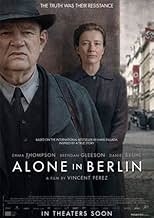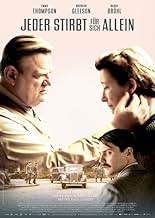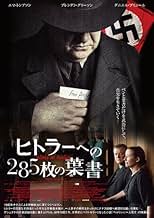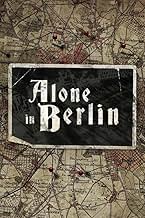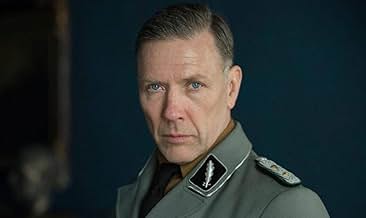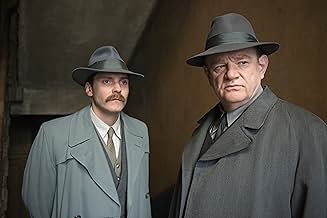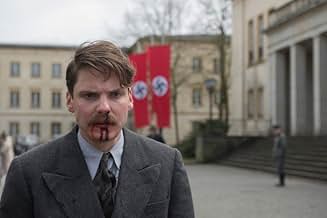VALUTAZIONE IMDb
6,5/10
10.118
LA TUA VALUTAZIONE
Dopo che una coppia della classe operaia tedesca nazista ha perso il figlio nella seconda guerra mondiale, decidono di vendicarsi lasciando segretamente carte scritte a mano a Berlino che de... Leggi tuttoDopo che una coppia della classe operaia tedesca nazista ha perso il figlio nella seconda guerra mondiale, decidono di vendicarsi lasciando segretamente carte scritte a mano a Berlino che denunciano il loro governo.Dopo che una coppia della classe operaia tedesca nazista ha perso il figlio nella seconda guerra mondiale, decidono di vendicarsi lasciando segretamente carte scritte a mano a Berlino che denunciano il loro governo.
- Premi
- 3 candidature
Joachim Bißmeier
- Fromm
- (as Joachim Bissmeier)
Trama
Lo sapevi?
- QuizBased on the novel "Jeder stirbt für sich allein" (Every Man Dies Alone) by Hans Fallada. The novel was allegedly based on Gestapo files to which Fallada was given access.
- BlooperEmma Thompson wears her wedding ring on her left hand. Germans, both men and women, wear them on their right hands. The German actor who plays Judge Fromm correctly wears his wedding ring on this right hand.
- Citazioni
Otto Quangel: What more can a man donate than his child?
- ConnessioniVersion of Jeder stirbt für sich allein (1962)
Recensione in evidenza
"Alone in Berlin" (German-French-British co-production; 2016 release; 105 min.) brings the story of a German couple, Otto and Anna. As the movie opens, we see a young German soldier running through the weeods, and he is shot and killed. The young man's parents, Otto and Anna, are informed by letter of his death, and they don't know how to cope with this tragic news. Eventually Otto decides to speak up against the Nazis, and Hitler in particular, by leaving provocative postcards (such as: "Hitler is a liar, Hitler is a killer") in prominent public places. Anna joins him in these potentially dangerous tasks. Eventually, the Nazis become aware of this, and a manhunt is started... At this point we're 15 min. into the movie, but to tell you more of the plot would spoil your viewing experience, you'll just have to see for yourself how it all plays out.
Couple of comments: this is the latest movie from Swiss actor/writer/producer/director Vincent Perez. Here he takes what amounts to a footnote in the annals of WWII and makes it, or at least tries to make it, into an epic battle between an elderly couple and the Nazi establishment. At certain moments, in particularly later in the film, it works quite well. But there are too many times that the films truly feels staged, I mean you can practically hear the director yell "and.... ACTION!", and an entire street with 1940s cars comes alive. The lead performances by Emma Thompson (as Anna) and Brendan Gleeson (as Otto) are fine, as they bring a quiet dignity to this couple that is so outraged by the tragic death of their son. Incidentally, it isn't until the closing credits that we get confirmation this movie is based on true events, and Otto and Elise really did exist (why they changed the woman's name to Anna, is not clear to me). Still, when all is said and done, it feels to me like the movie didn't quite carry this to its full potential, and that's a shame.
I had heard of this movie, but never had a chance to see it in the theater. I did catch it recently on Showtime. If you are interested in WWII, even if only a footnote of it, I'd suggest you check this out, be it on TV or VOD, or on DVD/Blu-ray, and draw your own conclusion.
Couple of comments: this is the latest movie from Swiss actor/writer/producer/director Vincent Perez. Here he takes what amounts to a footnote in the annals of WWII and makes it, or at least tries to make it, into an epic battle between an elderly couple and the Nazi establishment. At certain moments, in particularly later in the film, it works quite well. But there are too many times that the films truly feels staged, I mean you can practically hear the director yell "and.... ACTION!", and an entire street with 1940s cars comes alive. The lead performances by Emma Thompson (as Anna) and Brendan Gleeson (as Otto) are fine, as they bring a quiet dignity to this couple that is so outraged by the tragic death of their son. Incidentally, it isn't until the closing credits that we get confirmation this movie is based on true events, and Otto and Elise really did exist (why they changed the woman's name to Anna, is not clear to me). Still, when all is said and done, it feels to me like the movie didn't quite carry this to its full potential, and that's a shame.
I had heard of this movie, but never had a chance to see it in the theater. I did catch it recently on Showtime. If you are interested in WWII, even if only a footnote of it, I'd suggest you check this out, be it on TV or VOD, or on DVD/Blu-ray, and draw your own conclusion.
- paul-allaer
- 26 set 2018
- Permalink
I più visti
Accedi per valutare e creare un elenco di titoli salvati per ottenere consigli personalizzati
- How long is Alone in Berlin?Powered by Alexa
Dettagli
- Data di uscita
- Paesi di origine
- Sito ufficiale
- Lingua
- Celebre anche come
- Alone in Berlin
- Luoghi delle riprese
- Aziende produttrici
- Vedi altri crediti dell’azienda su IMDbPro
Botteghino
- Lordo Stati Uniti e Canada
- 33.125 USD
- Fine settimana di apertura Stati Uniti e Canada
- 8.869 USD
- 15 gen 2017
- Lordo in tutto il mondo
- 1.205.598 USD
- Tempo di esecuzione1 ora 43 minuti
- Colore
- Proporzioni
- 2.35 : 1
Contribuisci a questa pagina
Suggerisci una modifica o aggiungi i contenuti mancanti

Divario superiore
By what name was Lettere da Berlino (2016) officially released in India in English?
Rispondi

